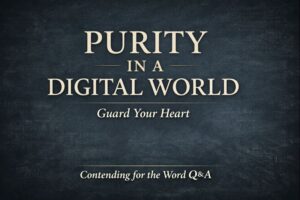⏱️ Estimated Reading Time: 7 min read
The book of Lamentations, which is the eloquent and poignant expression of Jeremiah’s sorrow over the fall of Jerusalem, is a potent reminder to us of what our attitude should be toward those who meet with the judgment of God. Rather than adopting an “I told you so” attitude or, even worse, rejoicing to see even the well-deserving meet punishment, Jeremiah laments over the grief and pain that he observes in those under God’s judgment. He also teaches us, by his example, that we cannot express sincere grief for the calamitous results of sin until we have first labored to overcome the sin that is causing the sorrow.
This mournful book—which has given Jeremiah the name of “weeping prophet”—contains a description of the judgments on the nation and the admission that the their current sorrows have been caused by their persistent sin (chapters 1-2); a reminder that this chastisement is for their good (chapter 3); a lament for the devastation that their sin has caused (chapter 4); and a prayer for the repentance and recovery of the people of Zion (chapter 5).
If there were any book in all of Scripture that might be devoid of any words of hope or comfort, surely it would be this one. Yet, even in the midst of all the pain and tears of Jeremiah, we find in chapter three sunrays shining through the gloom:
“But this I call to mind, and therefore I have hope: the steadfast love of the LORD never ceases; his mercies never come to an end; they are new every morning; great is your faithfulness” (Lamentations 3:21-23).
Looking In Vain for Help
“How the gold has grown dim…”
Can you relate to these opening words from Lamentations chapter four? Do you know what it is to work hard and sacrifice for something, only to find it is ultimately unfulfilling? Have you looked for happiness in a relationship, only to discover that even the closest loved one can’t meet all your needs? Or perhaps trusted in your retirement plan or mortgage equity for security and then found yourself vulnerable and exposed in the end?
Idols have a way of disappointing us. How much do your worldly friends really love you? The movie or music stars you look up to? The employer who wants you to devote your life to climbing the corporate ladder? The cars or gadgets or carpet or designer outfits you spend so much time dreaming about or delighting in? Would they care about you if you crossed them? Do they care about you intimately, genuinely, consistently? Forget giving their life for you, do they even know who you are?
Pastor Justin Buzzard points us to the root of the problem when he observes, “Everyone has to live for something and if that something isn’t the one true God, it will be a false God—an idol… That idol that you love? It doesn’t love you back. Idols don’t keep their promises.” Even seemingly good things like marriage and financial planning can become idols if we expect them to provide what only God can give, and no idol can bear the weight of our great neediness.
This is the hard lesson that Judah is learning in the book of Lamentations. They had looked to their wealth for security, and now the gold had become dim. They had trusted in their religious forms to keep them right with God, and now they were discovering how hollow their religion really was. They had even hoped that other nations might be able to stave off the judgment that God had prophesied was coming, but no one can save when God is the one afflicting.
“Our eyes failed, ever watching vainly for help; in our watching, we watched for a nation which could not save” (4:17). Judah had been looking for everything and everyone except God to help them, but idols have a way of disappointing us.
If you can relate to the pain and loss and emptiness that Judah experienced as God broke down their idols and brought the judgment their sins truly deserved, then I hope you will also learn a lesson from how Jeremiah responds. Rather than running to yet another feeble source of help or security, he turns to the very God who is chastening them. The God who always brings judgment for sin, Jeremiah knew, is also the God who always has mercy on those who come to him in repentance.
The final chapter of this book of laments ends with the valuable lesson that the God who condemns is the very same God who saves.
Turning to the God Who Turns Us
“Woe to us, for we have sinned!” (5:16).
The first step of real repentance is to hate the sin that has separated us from God, while also recognizing that God’s judgment on sin is right and good. We have sinned, and so we deserve to be cursed.
Jeremiah, on behalf of Israel, is expressing a deep, heartfelt regret for their sins as a nation. They had originally mistaken the presence of religious symbols for the approving presence of God, but they were wise to recognize that—although now the temple had been ransacked and those symbols are taken away—God was still accessible through repentance and prayer.
Israel was experiencing the righteous judgment of God for their persistent sin and idolatry. Yet in their repentance and turning to the very God who was afflicting them, we learn an invaluable lesson about sin, about repentance, and about the goodness of God.
“Restore us to yourself, O LORD, that we may be restored!” (Lamentations 5:21). This prayer expresses the utter inability of anyone to heal their own spiritual wounds, to draw near to God in their own strength, or to turn from sin without God’s divine intervention and assistance. As sinners, we are completely shut up to the grace of God; there is nowhere else to turn and no one else who can help. We cannot even repent with genuine tears unless God grants us true remorse for sin and gives us the desire to walk in his way.
Genuine repentance from idolatry, we see also, means not just turning away from idols but turning back to God: “restore us to yourself, O LORD.” Real sorrow for sin does not just regret the consequences of sin but sees that the root of our problem is our separation from God. Biblical repentance not only hates the sin but expresses love and longing for God.
Yet this prayer also expresses the certain conversion, the inevitable response of those who are so moved by the grace of God. When God restores us to himself, we will be restored! There has never yet been a heart so obstinate that God cannot overwhelm it with his love. Even the dirty tax-collector Matthew and the pharisaical Saul of Tarsus were won by the gracious work of God in their hearts.
What is your state today? Have you felt the overwhelming grace of God, moving by his Spirit in your heart, and turning you to Christ? Have you felt the resistance of your cold heart crumble before the warm rays of God’s goodness? Turn to God, and know that it is God who is turning you.




